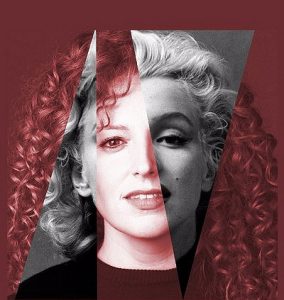
"Marilyn in Fragments"—Marissa Mulder's new show, directed by Sondra Lee and performed at the Laurie Beechman Theatre—doesn't follow the format of an ordinary cabaret "tribute" show. In her portrayal of Marilyn Monroe, Mulder doesn't br eak character until the very end of the show, and there is seldom a pause taken to allow for audience applause following musical selections. That's in part because the songs are often truncated in some way. Mirroring the psyche of the Marilyn character that Mulder plays here, the show's score consists mostly of scattered musical shards.
eak character until the very end of the show, and there is seldom a pause taken to allow for audience applause following musical selections. That's in part because the songs are often truncated in some way. Mirroring the psyche of the Marilyn character that Mulder plays here, the show's score consists mostly of scattered musical shards.
Mulder's Marilyn arrives onstage in a worried and vulnerable frame of mind. She is like a nocturnal animal emerging from her den, stumbling into broad daylight. Throughout the near-hour onstage, she is almost always somewhat bewildered, and sometimes she's downright panicked. As she interacts with the audience and with her pianist (the always-reliable musical director Jon Weber), her moods swing rapidly from playful and flirtatious to melancholy to bitterly angry. If there is a through line to her narrative, it's a tricky one to discern. The character ricochets from topic to topic: her childhood, her marriages, her career, her self-image. Sometimes she struggles to say what she needs to say. "My feelings don't happen to swell into words," she explains at one point. All of this can be frustrating for audience members, especially if they've come to the show to be entertained, to celebrate the warm and amusing aspects of the iconic star.
The program consists almost entirely of songs not associated with Monroe (although Cole Porter's "My Heart Belongs to Daddy," heard in the 1960 film Let's Make Love, –is included). Instead, Mulder performs a wide array of numbers written between 1880 and 2016. If you've ever wondered what it would be like to hear the Marilyn treatment on songs written by Alanis Morissette and Glenn Ballard or Tom Waits or Trent Reznor of Nine Inch Nails, here's your chance. But, again, you'll get only portions of certain songs. Even when Mulder presents a musical selection in its entirety, she will somehow curtail it. For instance, she performs Kander and Ebb's "My Coloring Book," and delivers a sustained, concentrated performance—until the last couple of lines, that is. Then the character seems to lose interest, speeding through the final few lyrics and moving on to something else.
Toward the end of the show, in one of Marilyn's more-lucid sequences, she gathers confidence, singing "Don't Rain on My Parade" (Jule Styne, Bob Merrill) from start to finish. When she concludes the number, Weber leaps to his feet and applauds her, prompting the audience to clap as well. The song is, of course, a signature number for Barbra Streisand, a performer who—unlike Monroe—has always made sure she is in extreme (some would say excessive) control. It's as if Monroe here soaks up some steely willpower for herself. But the moment doesn't last. Minutes later, she is singing Reznor's "Hurt," which contains the lines "I will let you down. I will make you hurt."
The most moving sequence of the evening soon follows with a snippet of "Believe Me, If All Those Endearing Young Charms" (John Andrew Stevenson, Thomas Moore), which Mulder sings to a projected image of Monroe. It's an unexpected but lovely choice at this point in the show to include this old song with its almost hymn-like quality. I only wish that Mulder, Lee, and Weber had decided to present the whole song, with its elegant and wide-ranging melody.
Mulder ends the evening with Ashford and Simpson's "Ain't No Mountain High Enough." It's an odd title with which to close. But it seems to be used to express the idea that redemption can come when a performer bonds with her audience through art. "Ain't no river wide enough/ To keep me from gettin' to you," the lyric goes. (The River Styx—separating the dead from the living—is not excepted.)
The memorable graphic image that Mulder has used to market this show is of a woman's face, created by mixing fragments of a Monroe photo with similar fragments from a portrait of Mulder. What Mulder seems to be doing onstage is something similar: reassembling the jigsaw puzzle that was Monroe, substituting parts of herself for missing or hopelessly damaged pieces.
Clearly Mulder feels a strong affinity for the woman she portrays. Those who have followed her cabaret career over the past several seasons will certainly have noticed a quality of voice and affect that's a bit Monroe-like. But they've also seen how Mulder has grown as a performer—how she has found increasingly greater emotional depth when interpreting songs. She takes chances—not always playing things safe. And that's certainly the case here. Her openness, curiosity, courage, and commitment make "Marilyn in Fragments" a worthwhile evening of cabaret, even if it's sometimes an uneasy ride.
"Marilyln in Fragments"
Laurie Beechman Theatre – May 24, 31; June 6, 14, 17